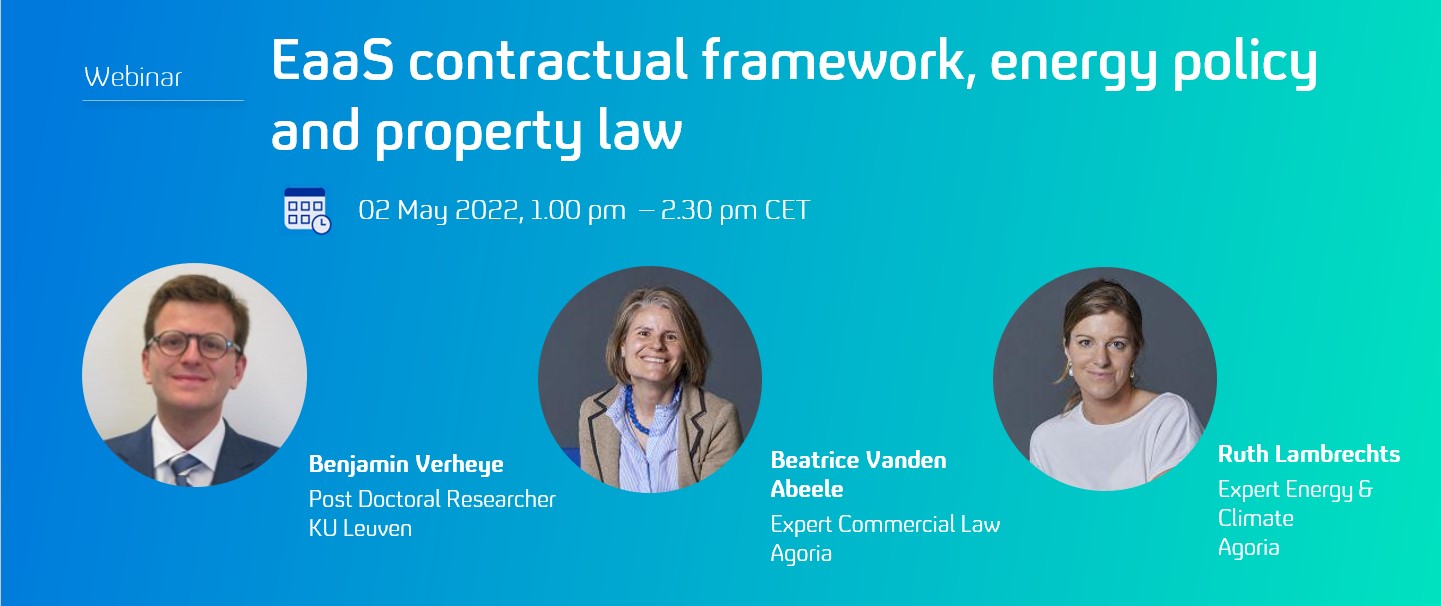EaaS Virtual Dialog Series - Belgium
Efficiency-as-a-service contractual framework, energy policy and property law
The EaaS model
Efficiency as a Service (EaaS) is one of these models that allows end users to access the benefits of high end energy-efficient technologies through a pay-per-use or pay-per-outcome agreement. Under EaaS, the technology provider is responsible for the design, installation, operation, performance and maintenance of the equipment as well as its end of life management.
Such a shift in responsibilities entails a transfer of risks from the customer to the EaaS provider, such as:
- the financial risk related to the upfront cost of the equipment,
- the technical risks related to equipment failures,
- the performance risks related to the system’s efficiency,
- the business risks linked to decline in demand and
- the energy price risk linked to fluctuation in energy price
- the loss of equipment ownership risk in view of the Belgian Property law
Part of these risks can be contractually mitigated. Agoria commissioned DLA Piper to develop a standardized EaaS Agreement to support technology providers transition from a typical sale of an energy efficiency project/equipment to a pay-per-use offering. The EaaS standardised agreement brings forward a balanced agreement between a potential customer and an EaaS provider, and establishes a clear and transparent contractual framework that comprises and regulates all-important servitisation aspects.
Why join the webinar?
Join the webinar on EaaS contractual framework, energy policy and property law to learn about:
- What are the roles and responsibilities of a technology provider under an EaaS agreement and what risks does a transition from a typical sales transaction to a service agreement entail?
- What are the potential impacts of the Belgium Property and Real Estate Laws on an EaaS offer? Under what circumstances can a loss of ownership occur and what type of projects face such a risk?
- What are the essential clauses of an EaaS agreement and what elements should the contract address to mitigate risks faced by an EaaS provider?
- What is the legal framework for energy communities, energy sharing and flexibility? How can energy communities be integrated in an EaaS project and what are the current limitations?
Our speakers
- Benjamin Verheye, Postdoctoral Researcher at KU Leuven: Benjamin is a post-doctoral researcher focusing his research on law and technology (blockchain, smart contracts, AI, smart building) and law and sustainability, with special attention to real estate law and the notarial profession. In 2019 Benjamin won the annual TPR prize with his contribution on real estate in the circular economy (www.tpr.be).
- Beatrice Vanden Abeele, Expert Commercial Law at Agoria: Beatrice is a company lawyer working with Agoria for about 10 years. She focuses on business and competition law, providing legal advice to Agoria member companies as well as advocacy and monitoring of legislative initiatives. She is involved in circular economy projects with regard to the contractual aspects and legal questions deriving from new business models, such as servitisation.
- Ruth Lambrechts, Expert Energy & Climate at Agoria: Ruth is an energy & climate policy expert working with Agoria for about 9 years. She focuses on the regulatory framework of climate policy, energy markets and energy policy legislation such as taxes and energy efficiency legislation. As project manager for Fit for 55, Ruth is also heavily involved in the European energy legislation and its impact on Belgian technology companies.

Background
This webinar is part of a series of events organised by Agoria and its consortium partners in the framework of the European Commission Horizon 2020 funded project « Efficiency-as-a-Service ». The project aims at accelerating the market adoption of energy efficient solutions in the EU through servitization. Similar events are being organised in the Netherlands, Spain and the EU by Agoria’s consortium partners EIT Innoenergy, ANESE and BASE.
For more information please contact Mira Tayah.
